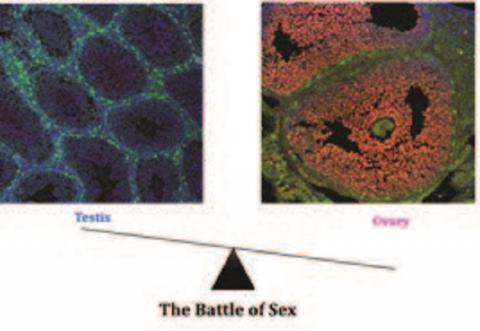ביורפואה
ביו-רפואה, שילוב בין ביולוגיה לרפואה, הינו תחום מרכזי בקידום הבריאות ושיפור איכות החיים של האדם. מדעני BINA נמנים עם חוקרים מרכזיים בבריאות האדם ובמחלות, ומפתחים טכנולוגיות רפואיות חדשניות שמצילות חיים על ידי אפשרות לאבחנה מדויקת, טיפולים מותאמים אישית, וטיפולים ממוקדים. המחקר ב-BINA הוא רב-גווני, מננו-חלקיקים מותאמים אישית לאבחון ושגור תרופות ממוקד, גישות חדשניות למחלות נוירו דגנרטיביות, זיהומים ויראליים וסרטן. מעבדות BINA מייצרות פריצות דרך מדעיות המשמשות קרש קפיצה לאסטרטגיות הרפואיות של המחר.
- שיטות מבוססות-ננו לשיגור ממוקד של תרופות
- מתודולוגיות חדשניות לדיאגנוסטיקה
- כימיה וביוכימיה של חמצן פעיל בליפוזומים ובממברנות דו-שכבתיות
- ליפוזומים כנשאי תרופות ומודלים לתאים חיים
- לימוד אינטראקציית וירוס-מאחסן בשיטות מיקרופלואידיות
- שימוש בננו-חלקיקים להשתקת גנים
- דינמיקת mRNA בתאים חיים ברמת התא הבודד, המולקולה הבודדת והגן היחיד
- אינטראקציית חלבון-DNA ברמת המולקולה הבודדת
- ננו-הנדסה עצבית
- סידור הגנום בגרעין והפרתו בתאי סרטן
- שיטות ננו-מטריות להדמיה וטיפול בסרטן מוח
Researchers
-
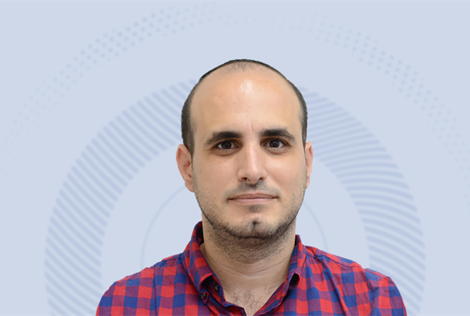
Optical and Acoustical Neuroimaging Lab

Our neuroengineering research focuses on developing advanced acoustical and optical neuroimaging methods to understand the brain's neural circuitry and fundamental mechanisms. These methods have significant potential in brain-computer interfaces and clinical studies. We combine cutting-edge Electrical Engineering and Neuroimaging techniques, including single photon sensing, superconductive sensing, machine learning, FPGA design, nanoelectronics, biomedical sensing, and neuroimaging.
-

• Molecular characterization of complex tissues • Spatial genomics
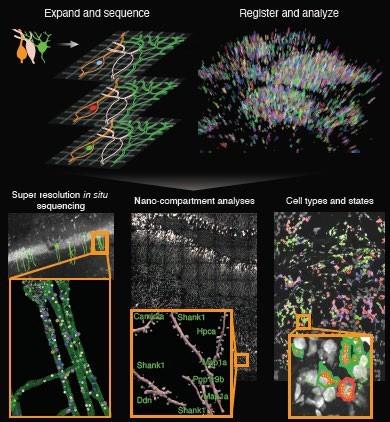
Nano-precision in the location of RNA molecules inside tissues is crucial for many biological processes including learning and memory. The multiplexed measurement of the nanoscale position of these molecules allows mapping the heterogeneity of complex tissues, and therefore can lead to a better understanding of many diseases including cancer.
-


The Biofilm Research Laboratory
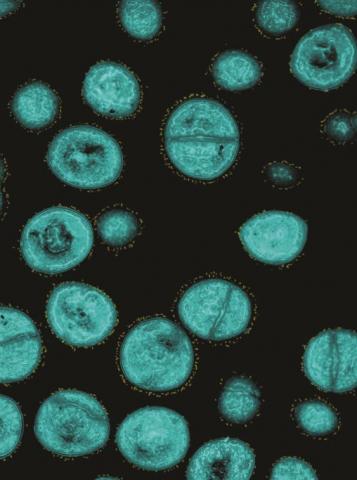
• Bacterial biofilms
• Nanoparticles with anti-biofilm properties
• Bacterial virulence
• Bio-ethanol production -

פרופ' חיה ברודי
972-3-531-8266
Cancer stem cells from brain tumors
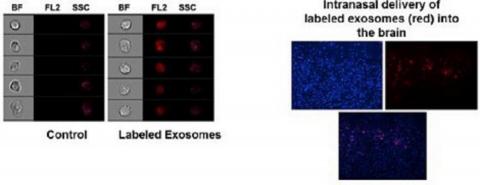
• Studying the role of protein kinase C in the regulation of cellular growth, differentiation and apoptosis.
• Studying the molecular mechanisms underlying the development of brain tumors: Exploring signal transduction pathways involved in glial cell transformation and identification of novel proteins and genes expressed in brain tumors; development of in vivo and in vitro models of brain tumors; development of novel diagnostic and therapeutic approaches for brain tumors; studying the role of stem cells in the development of brain tumors and their use as a vehicle in gene therapy.
• The bi-directional interaction between the nervous and immune systems and the role of this interaction in the function of neuronal and glial cells during physiological and pathological conditions.
-
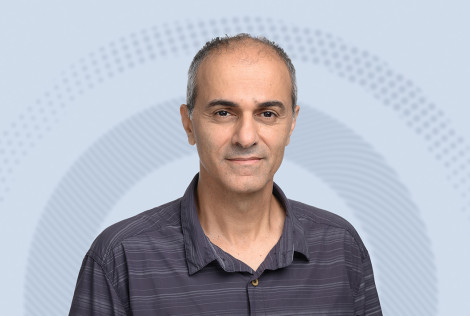
פרופ' גיל גובס
972-3-5317390
Biomaterials and Advanced Materials group
Research in my group has been focused on revealing and explaining the fundamental interactions that underlie inorganic material formation in nature, a process known as biomineralization.
We particularly make use of our expertise in solid-state NMR spectroscopy to analyze the rudimentary processes of biogenic material formation in atomic/molecular level. Unveiling the structure/activity relations in these specialized biomolecules involved in regulation of solid biomaterial formation has been particularly elusive.
Using these findings, we develop new biomaterials for hard tissue applications based on rationale guidelines.
We implement NMR characterization in materials research to understand interfaces between nanomaterials at great detail and employ molecular insights to design concept materials that are more environment friendly.
-
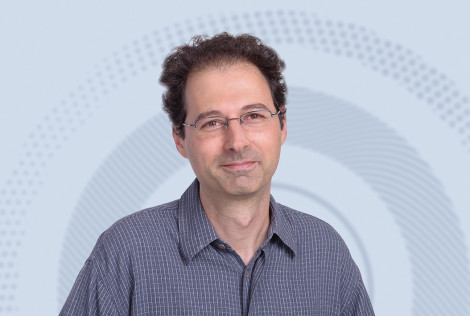
פרופ' דורון גרבר
972-3-738-4508
Integrated microfluidic applications for studying protein-protein interactions, gene regulation, intracellular mechanisms and whole cell intercellular studies
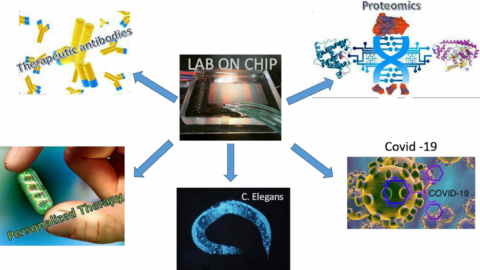
• Virus host interactions
• System biology
• Microfluidics -

פרופ' עמוס דניאלי
972-3-738-4653
Optical Imaging and Biosensing Laboratory
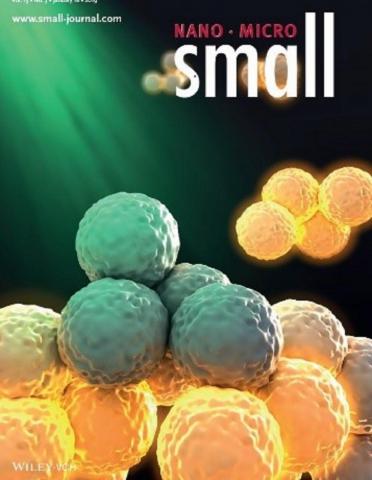
• Rapid and highly sensitive detection of biomarkers, such as proteins and specific DNA sequences
• Detection of protein-protein interactions
• Magnetic manipulation of nanoparticles, design of magnetic poles, magnetic force optimization -

פרופ' אייל הנדל
972-3-531-7316
Precise and efficient CRISPR genome editing as a curative therapy for genetic disorders
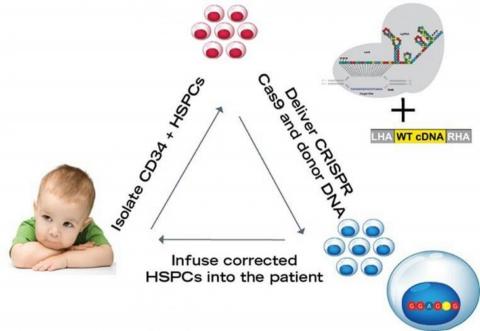
• Biotechnology
• Genetic therapy
• Genetic engineering
• Developing CRISPR technology as a method of gene therapy for genetic diseases -
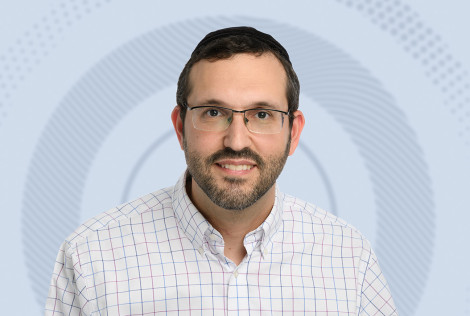
פרופ' יעקב טישלר
972-3-738-4514
In the Device Spectroscopy Laboratory, we use optical spectroscopy to study nanoscale materials such as molecular organics and more generally nanostructured semiconductors, and then devices composed of these materials
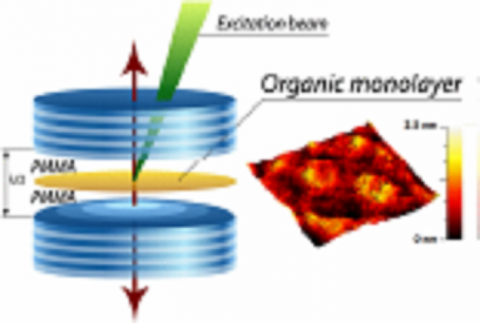
• Coherent coupling in light-matter coupled systems: Organic Lasers, J-aggregates, and Polaritons.
• Ultra-high resolution scanning microcopy and spectroscopy.
• Applications of ultra-fast non-linear spectroscopy for energy sustainability.
• Novel approaches to organic crystal growth and OLED deposition -
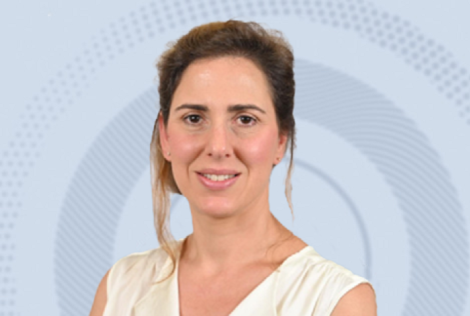
ד"ר מורן ידיד
0543561226
Bioengineering and Regenerative Medicine
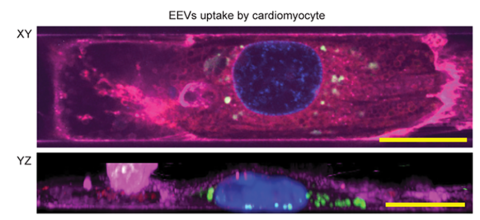
A single cardiomyocyte, micropatterned on soft silicon surface. The images demostrates two views of uptake of fluorescently labeled extracellular vesicles in the cardiomyocyte.
Image was taken by a spinning disk Olympus microscope.
-

פרופ' ניסן יששכר
972-3-738-8389
Host-Microbiome Interactions in Health and Disease
Our lab studies how cells of the immune system in the gut interact with their environment - specifically the gut microbes (microbiota) and the enteric nervous system – and how these interactions control the balance between inflammation and tolerance, in health and disease. For this purpose, we combine microscopy, genomics, and molecular biology, with a unique gut organ culture system which we have recently developed. This system allows us to perform experiments which cannot be readily performed otherwise and has recently led us to discover that enteric neurons mediate microbiota-induced T-cells development in the gut. Dissecting the molecular mechanisms underlying neuro-immune-microbiome cross-talks may lead to the development of microbiome- based, personalized therapy for inflammatory and autoimmune diseases.
-

פרופ' ארז לבנון
972-3-738-4523
Genomics Research
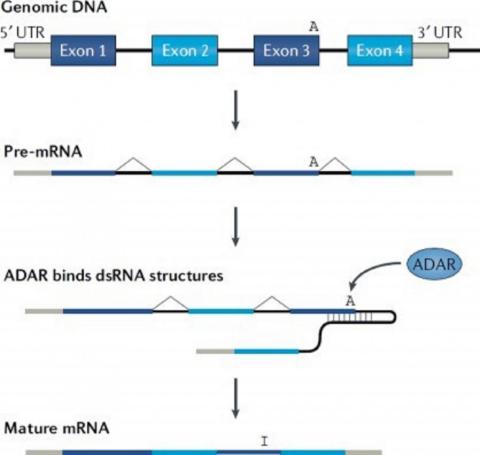
We study the dynamics of genetic information, and how it affects disease, evolution and, behavior. Specifically, we develop technology and algorithms to uncover the full extent of A- to-I RNA editing in human and animal models. We are also develop technology to manipulate the genomic information by recruiting endogenous cellular RNA editing processes.
-

פרופ' ג'אן-פאול ללוש
972-3-531-8324
Innovative Surface Engineering of Magnetic/Non-Magnetic Nanomaterials
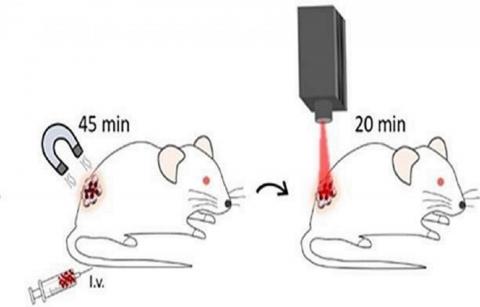
• Functional electroconductive polymers (ECPs) and nano/microparticle fabrication
- Functionalization/nanostructuration of polymeric films
• Magnetically-responsive composite polymer-nanoparticles for ultrasensitive detection of DNA hybridization and drug release using combinatorial approaches
• ECPs-microarrays for diagnostics
• ECPs-biosensors/immunosensors
• High-throughput screening of polymersupported chiral catalysts
• (1,3)-dienyliron-carbonyl complexes in asymmetric synthesis
• Selective deprotective chemistries of-OSiR3 ethers mediated by Vilsmeier- Haack reagents (kinetic resolutions/ deracemizations of meso compounds).
• Functionalization of carbon nanotubes et use in self assembling systems/composites materials.
• Polymodal silica and silicon carbide nanoparticles for hard surfaces and their mode of functionalization using ECPs. -

פרופ' שולמית מיכאלי
972-3-531-8068
• Mechanism and machinery of nucleolar gene silencing
- The use of nanoparticles for cytoplasmic and nuclear gene silencing
- Trans-splicing in trypanosomatids
- Protein translocation in trypanosomatids
- RNA modifications mediated by guide RNAs
- RNAi silencing in plants
- The use of nano particles as RNAi carriers into the nucleous
-

פרופ' יוסי מנדל
972-3-738-4234
Ophthalmic Science and Engineering Lab
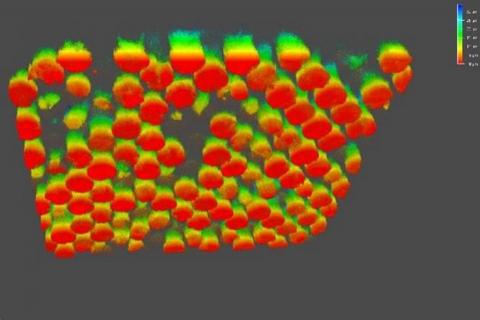
- Electro-cellular interfaces, optical and electronic micro-devices development
- Applied science for improving diagnosis, treatment and prevention of various ophthalmicdiseases.
- Artificial introduction of the visual information and its processing by the retina and the visual cortex.
- Electro-cellular interface with the autonomic system and application of high electrical field for solid tumor ablation (IRE - Irreversible Electroporation).
-

פרופ' שלמה מרגל
972-3-531-8861
Polymers, biopolymers and nanotechnology for biomedical and industrial applications
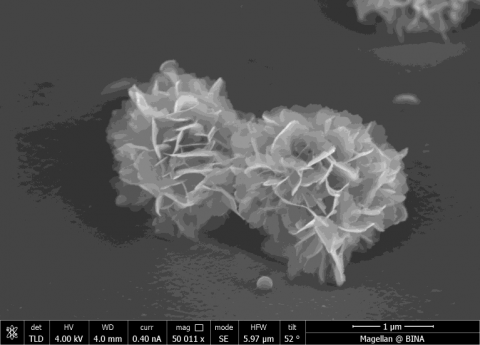
- Polymers & biopolymers
- Surface modification
- Encapsulation
- Functional nano/micro-particles
- Thin film coatings (self-cleaning, antibiofouling, UV absorbers, anti-fog and superhydrophobic coatings)
- Colloidal chemistry and biological and medical applications of polymers (drug targeting, imaging, contrast agents, neurodegenerative diseases, cancer diagnostics and therapy, etc.)
- Nano-agriculture
-

פרופ' רחלה פופובצר
972-3-531-7509
Nanotheranostics for Personalized Medicine
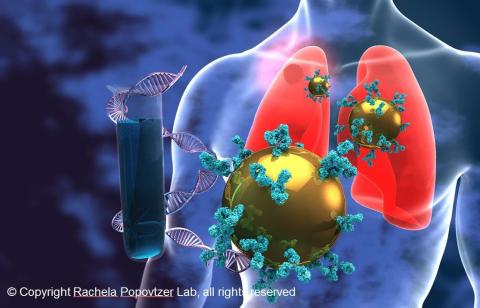
• Molecular CT imaging of cancer using targeted gold nanoparticles.
• Theranostic approaches for Alzheimer’s and Parkinson’s Diseases.
• Metabolic based imaging and therapy.
• Optical/chamical imaging of enzymatic activity.
• Nanoparticle-based strategies for targeted drug delivery.
• In-vivo cell tracking techniques. -

פרופ' אריה פרימר
972-3-531-8610
The synthesis of strained olefins and their photosensitized reactions with singlet and triplet oxygen.
• The organic chemistry of active oxygen species within organic media, liposomal lipid bilayers, and biomembranes.
• The preparation of high temperature thermo-oxidatively stable aerospace polymers.
• The preparation, characterization and neutralization of green reduced sensitivity high energy compounds -

פרופ' עמית צור
972-3-738-4541
The mammalian cell cycle
- Cell growth and size homeostasis of proliferating cells
-

פרופ' תומר קליסקי
972-3-738-4656
Single-cell genomics of kidney development, regeneration, and cancer
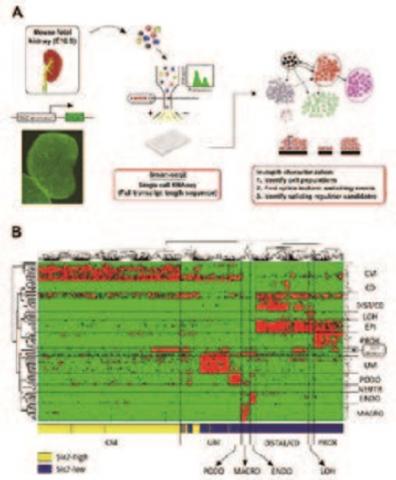
• Biochips & Sensors
• Disease Treatment
• Drug Delivery
• Genomics, Proteomics & Glycomics
• Imaging -

פרופ' גל קמינקא
972-3-5317607
Artificial intelligence and multi-robot systems
Computational mechanisms that underly intelligent social behavior, artificial and natural.
Such mechanisms include the ability to understand what others are doing and intend to do, and to generate appropriate cooperative, coordinated behavior.
This research emphasizes both theory and experiments with robots to synthesize social intelligence in the lab, and in real-world applications including applications in molecular nano-scale robots
-

פרופ' שי רהימפור
+972-3-5317412 -

פרופ' שרון רוטשטיין
972-3-7384307
Biomolecular EPR Spectroscopy lab
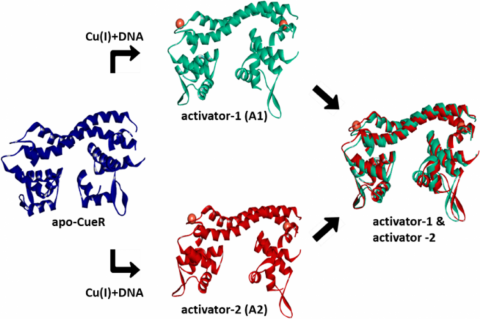
• plasmonics
• molecules-surface plasmons interaction
• molecular dynamics
• strong coupling systems
• Near field spectroscopy
• Second Harmonic Generation (SHG) -

פרופ' ירון שב-טל
972-3-531-8589
Focus on the processes of mRNA transcription, trafficking, and export from the nucleus.
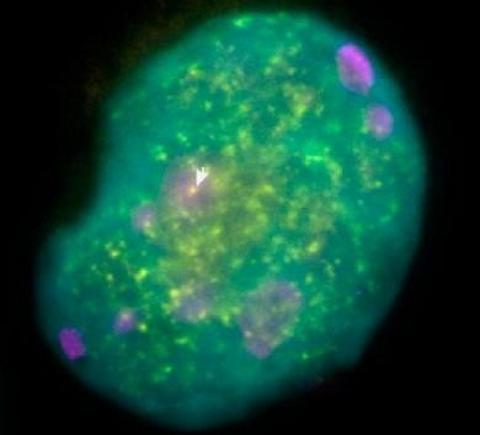
• Gene expression control in live cells
• Live-cell imaging and RNA dynamics
• Nuclear structure and function -

פרופ' גלית שוחט - אופיר
972-3-738-4208
Neurogenetics of motivation and social behavior
Our research aims to uncover the molecular and neural mechanisms that shape the interplay between social interaction and motivational behaviors. We use a combination of cell specific transcriptome analysis, spatial RNA maps, state of the art neurogenetic tools and novel tracking and machine vision technologies.
-

פרופ' אורית שפי
972-3-531-7079
Neuroengineering and Regeneration
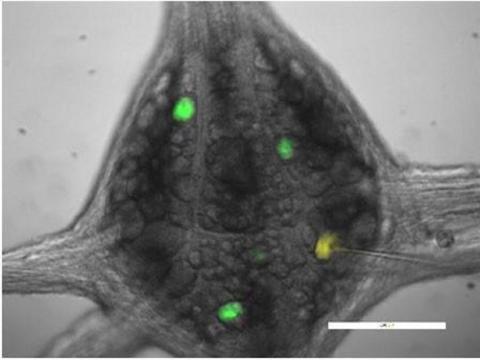
• Neurobiological systems development: image processing and network analysis
• Tissue Engineering: Developing skin grafts that enable reinnervation and regeneration
• Developing devices for reagents delivery into live tissue at a microscopic resolution
• Neuroprosthetic devices: Neuron-Chip interface -

פרופ' רונית שריד
972-3-531-7853
Human Herpesviruses
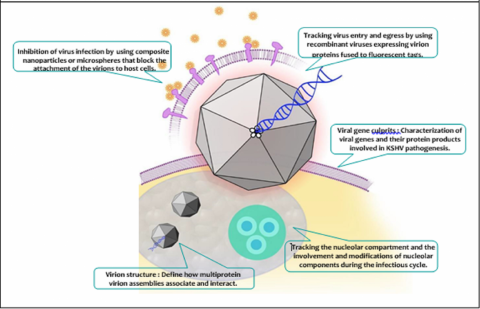
• The study of the etiology of cancer is critical to understanding how to prevent this disease and to improve treatment.
• Exploring the Cellular and Viral Pathways of KSHV Infection Cycle and Pathogenesis
• KSHV: Clinical and Epidemiological Studies
• Drug Discovery, Design and Delivery Research for Infectious Disease




